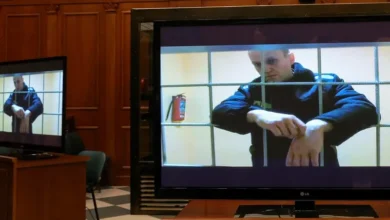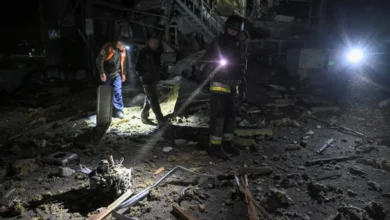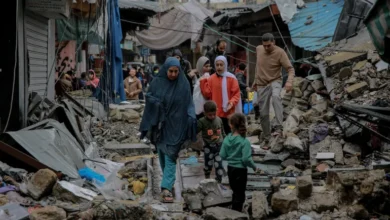‘They can’t break our spirit’: Jenin residents after Israel siege

Waled Rashed Mansour’s arm is blue where an Israeli military dog attacked him, the memory as raw as the wound.
“They came into our home, they blew up the doors,” the 65-year-old recalled, in the Jenin refugee camp in the occupied West Bank. “They unleashed their dog at me. The dog ran and attacked me on my chest.”“They” are the Israeli military, which on Wednesday morning announced that it was pulling out of the camp after two days of an intense aerial and ground assault in which at least 11 Palestinians were killed, and dozens wounded.
As Israel’s biggest siege on Jenin in two decades wound down, tales of trauma and devastation emerged from the small settlement that has been home to three generations of Palestinians who had to flee their ancestral land during the Nakba (catastrophe) in 1948.
But also evident was a firm resolve, and a defiance aimed at Israel and its international allies.
“The message to the world and the occupation is that this camp will keep on going,” said 56-year-old Ahmed Abu Hweileh, a resident of the refugee camp. “They tried to destroy it and it came back up.”Israel has justified the attack as targeted at armed groups operating out of Jenin, which has become a symbol of resistance to Israel’s illegal occupation of the West Bank.
But residents of the camp said it was civilians, not armed fighters, who bore the brunt of the Israeli assault.
Raed Jameel Mohammad Taleb, 39, said Israeli snipers entered his home on Monday and used it as a pad from which to launch attacks. Taleb lives with his wife, mother and two children.Meanwhile, missiles flew outside. Then, armoured tractors came and levelled everything on the street – including Taleb’s car. “I used this car to go to work every day,” he said. “We weren’t expecting the size of this destruction.
“The goal is to ruin and destroy.”Around sunset on Tuesday, Israeli troops told 46-year-old Ayman Saadi and his family that they needed to evacuate because the soldiers wanted to blow up a neighbouring home.
Saadi has six children, including a daughter with special needs and a three-year-old – both of whom he carried as the family fled the violence.
“They flipped over the cars, the entire area is destroyed,” he said.
That is no coincidence, according to Hweileh.
“They said they came for the armed men, but instead they punished the people,” he said.










